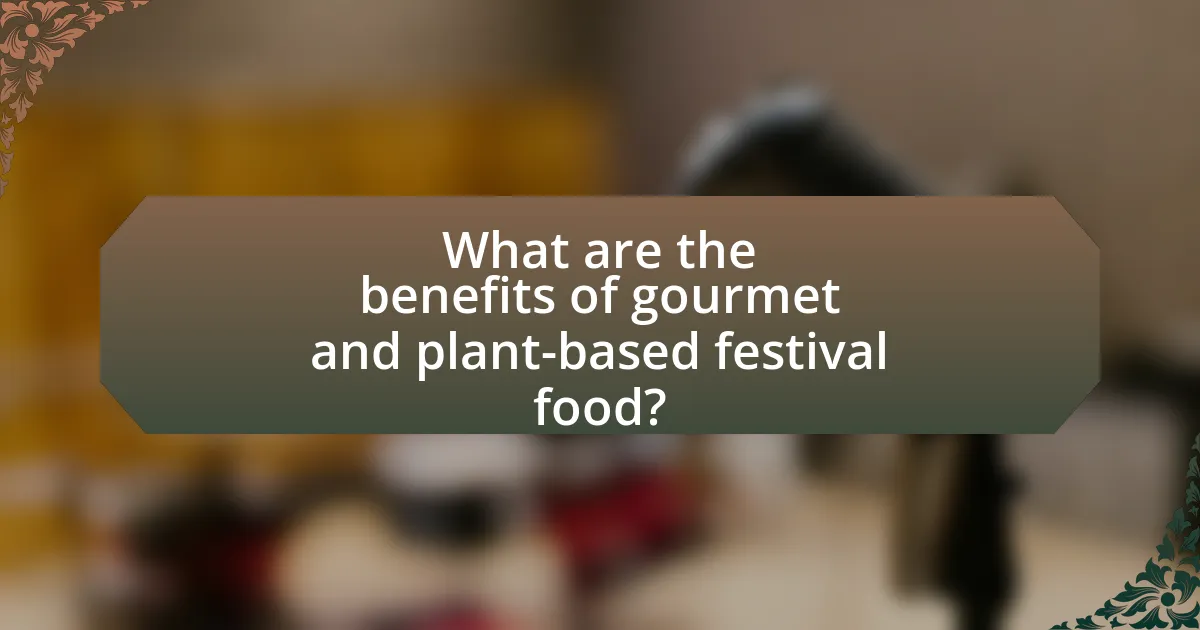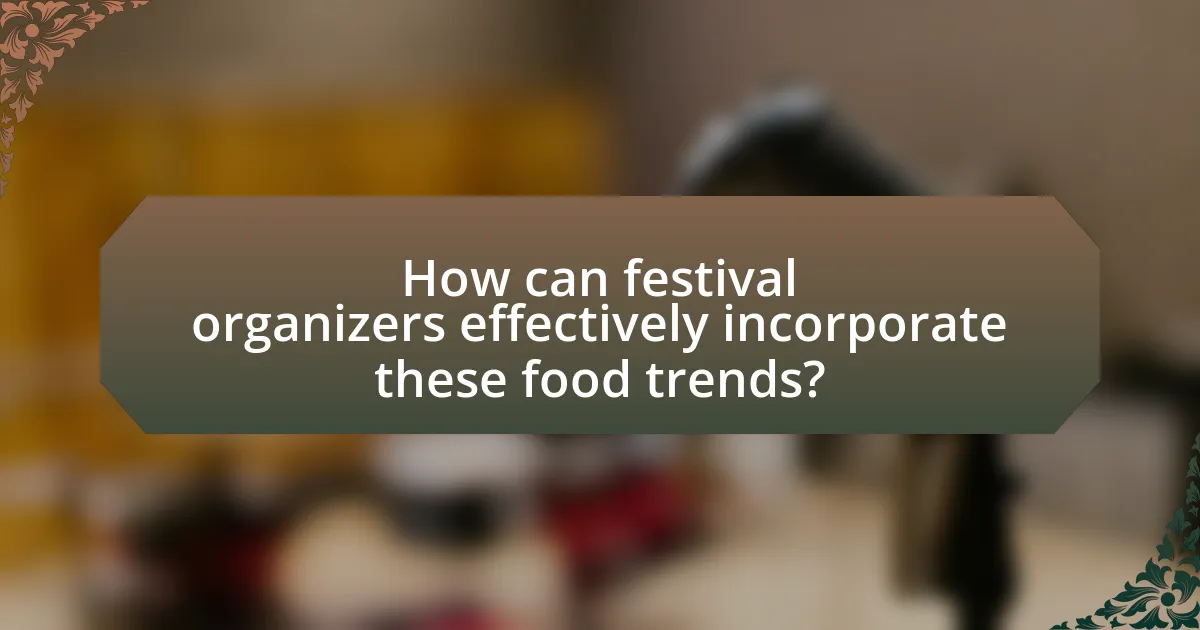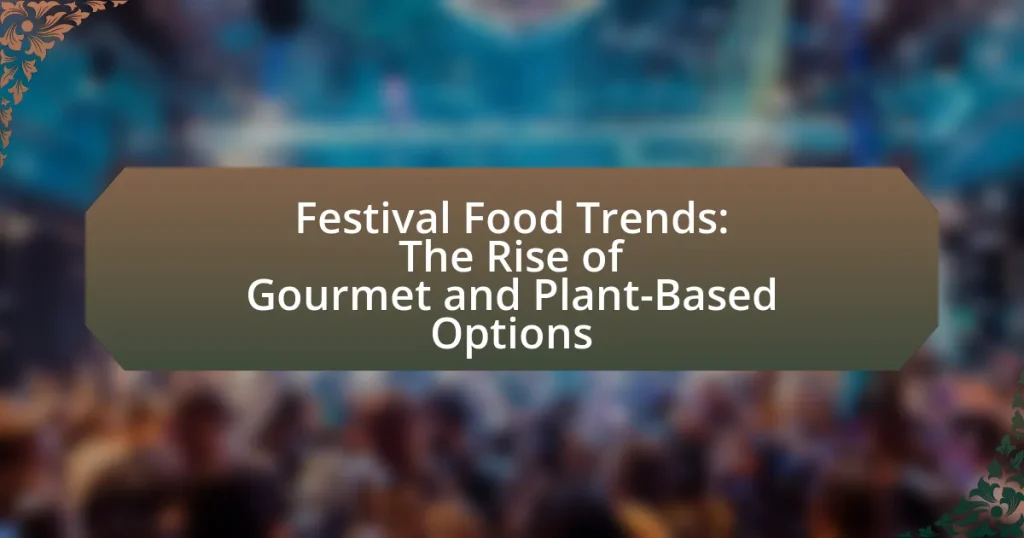The article focuses on the current trends in festival food, highlighting the rise of gourmet and plant-based options. It discusses how gourmet offerings have evolved to include high-quality, artisanal dishes that enhance the festival experience, while the demand for plant-based foods reflects a shift towards healthier and more sustainable eating habits. Key factors driving these trends include consumer preferences for unique flavors, health benefits, and environmental considerations. The article also examines the impact of gourmet and plant-based options on festival revenue, attendee satisfaction, and food diversity, along with best practices for ensuring food quality and managing waste at events.

What are the current trends in festival food?
Current trends in festival food include a significant rise in gourmet offerings and plant-based options. Gourmet food trucks and stalls are increasingly popular, providing high-quality, artisanal dishes that elevate the festival dining experience. Additionally, the demand for plant-based foods has surged, with many festivals featuring vegan and vegetarian options that cater to health-conscious and environmentally aware attendees. According to a report by the Plant-Based Foods Association, the plant-based food market has grown by 27% in the past year, reflecting a broader shift in consumer preferences towards sustainable eating.
How have gourmet options evolved in festival settings?
Gourmet options in festival settings have evolved significantly to include diverse, high-quality food offerings that cater to changing consumer preferences. Initially dominated by traditional fair food, festivals now feature gourmet food trucks, artisanal vendors, and chef-driven pop-ups that emphasize fresh, locally sourced ingredients. This shift is evidenced by the rise of plant-based options, with many festivals incorporating vegan and vegetarian dishes to meet the demand for healthier and sustainable choices. According to a 2022 report by the National Association of Specialty Food Trade, 60% of festival-goers expressed a preference for gourmet food experiences, highlighting the growing trend towards culinary innovation at events.
What defines gourmet food at festivals?
Gourmet food at festivals is defined by its high-quality ingredients, innovative preparation methods, and artistic presentation. This type of food often emphasizes unique flavor combinations and culinary techniques that elevate traditional festival fare. For example, gourmet food vendors may use locally sourced, organic produce and artisanal products to create dishes that reflect both creativity and sustainability, aligning with the growing trend of plant-based options. The rise of gourmet food at festivals is supported by consumer demand for more sophisticated dining experiences in casual settings, as evidenced by the increasing presence of food trucks and pop-up restaurants that specialize in gourmet offerings.
How do gourmet options enhance the festival experience?
Gourmet options enhance the festival experience by providing high-quality, diverse food choices that elevate the overall enjoyment and satisfaction of attendees. These elevated culinary offerings often feature unique flavors, artisanal ingredients, and innovative presentations, which contribute to a more memorable and immersive atmosphere. Research indicates that food quality significantly impacts event satisfaction; for instance, a study published in the Journal of Hospitality and Tourism Research found that gourmet food options can increase attendees’ perceived value of the event, leading to higher levels of engagement and enjoyment.
Why is there a growing demand for plant-based options at festivals?
There is a growing demand for plant-based options at festivals due to increasing consumer awareness of health, environmental sustainability, and ethical considerations. Research indicates that 39% of Americans are trying to incorporate more plant-based foods into their diets, driven by concerns over health issues such as obesity and heart disease, as well as the environmental impact of meat production, which contributes significantly to greenhouse gas emissions. Additionally, festivals are adapting to cater to diverse dietary preferences, reflecting a broader cultural shift towards inclusivity and sustainability in food choices.
What factors contribute to the rise of plant-based diets among festival-goers?
The rise of plant-based diets among festival-goers is primarily driven by increasing health consciousness, environmental concerns, and ethical considerations regarding animal welfare. Health-conscious individuals are opting for plant-based options due to their perceived benefits, such as lower risks of chronic diseases and improved overall well-being. Environmental concerns are significant, as many festival-goers recognize the impact of animal agriculture on climate change and resource depletion, prompting a shift towards more sustainable food choices. Additionally, ethical considerations regarding the treatment of animals are influencing dietary preferences, with many people choosing plant-based diets to align their eating habits with their values. According to a 2021 survey by the Plant Based Foods Association, 57% of consumers reported that they are more likely to choose plant-based options when dining out, reflecting a broader societal trend that is evident at festivals.
How do plant-based options cater to diverse dietary preferences?
Plant-based options cater to diverse dietary preferences by offering a wide range of ingredients that accommodate various dietary restrictions, such as vegan, vegetarian, gluten-free, and allergen-free diets. These options include legumes, grains, fruits, vegetables, nuts, and seeds, which provide essential nutrients while avoiding animal products. For instance, a study published in the Journal of Nutrition found that plant-based diets can meet nutritional needs without animal-derived foods, making them suitable for individuals with lactose intolerance or those avoiding meat for ethical reasons. Additionally, the versatility of plant-based ingredients allows for creative culinary applications, enabling chefs to craft dishes that appeal to different tastes and dietary requirements, thus enhancing inclusivity at food festivals.

What are the benefits of gourmet and plant-based festival food?
Gourmet and plant-based festival food offers numerous benefits, including enhanced flavor profiles, health advantages, and environmental sustainability. These foods often utilize high-quality ingredients and innovative cooking techniques, resulting in unique and appealing dishes that elevate the festival experience. Additionally, plant-based options are typically lower in saturated fats and cholesterol, contributing to better heart health and overall well-being.
Moreover, the production of plant-based foods generally requires fewer natural resources, such as water and land, compared to animal-based foods, thus reducing the environmental impact. According to a study published in the journal “Nature,” shifting towards plant-based diets could reduce greenhouse gas emissions by up to 70% by 2050. This combination of culinary excellence, health benefits, and sustainability makes gourmet and plant-based festival food a compelling choice for attendees.
How do gourmet foods impact festival revenue?
Gourmet foods significantly enhance festival revenue by attracting a higher spending demographic and increasing overall attendee satisfaction. Festivals that incorporate gourmet food options often see increased ticket sales and higher per capita spending, as consumers are willing to pay a premium for unique culinary experiences. For instance, a study by the National Association of Festivals found that festivals offering gourmet food options reported a 30% increase in revenue compared to those with standard food offerings. This trend indicates that gourmet foods not only elevate the festival experience but also contribute directly to financial success.
What are the pricing strategies for gourmet food vendors?
Gourmet food vendors typically employ premium pricing, value-based pricing, and psychological pricing strategies. Premium pricing reflects the high quality and exclusivity of gourmet products, often setting prices significantly above standard offerings to convey luxury. Value-based pricing focuses on the perceived value to the customer, allowing vendors to charge based on the unique attributes and experiences their products provide. Psychological pricing, such as pricing items at $9.99 instead of $10, can influence consumer perception and encourage purchases. These strategies are supported by market research indicating that consumers are willing to pay more for gourmet experiences, as evidenced by the growth of the gourmet food market, which was valued at approximately $174 billion in 2021 and is projected to continue expanding.
How does gourmet food attract a wider audience?
Gourmet food attracts a wider audience by offering unique flavors, high-quality ingredients, and visually appealing presentations that enhance the dining experience. This appeal is supported by the growing consumer interest in culinary exploration and the desire for premium dining experiences, as evidenced by a 2021 report from the National Restaurant Association, which indicated that 60% of consumers are willing to pay more for gourmet options. Additionally, gourmet food often incorporates local and sustainable ingredients, aligning with the increasing demand for ethical and environmentally conscious dining choices.
What health benefits do plant-based options provide at festivals?
Plant-based options at festivals provide numerous health benefits, including lower calorie intake, reduced risk of chronic diseases, and improved digestion. These options are typically rich in essential nutrients, such as vitamins, minerals, and antioxidants, which contribute to overall health. For instance, a study published in the Journal of the American Heart Association found that plant-based diets can lower the risk of heart disease by up to 32%. Additionally, plant-based foods are often high in dietary fiber, which aids in digestion and promotes gut health. This combination of factors makes plant-based options a healthier choice for festival-goers seeking nutritious food alternatives.
How do plant-based foods contribute to sustainability at events?
Plant-based foods contribute to sustainability at events by significantly reducing the carbon footprint associated with food production. The production of plant-based foods typically requires less land, water, and energy compared to animal-based foods; for instance, producing one kilogram of beef emits approximately 27 kilograms of CO2, while producing one kilogram of lentils emits only about 0.9 kilograms of CO2. Additionally, plant-based diets can lead to decreased greenhouse gas emissions, as livestock farming is a major contributor to methane emissions. By incorporating plant-based options, events can promote environmental responsibility and align with sustainable practices, appealing to eco-conscious attendees.
What nutritional advantages do plant-based options offer festival attendees?
Plant-based options provide festival attendees with numerous nutritional advantages, including lower saturated fat content, higher fiber levels, and increased intake of essential vitamins and minerals. These options typically contain less cholesterol and fewer calories compared to animal-based foods, promoting heart health and weight management. For instance, a study published in the Journal of the American Heart Association found that plant-based diets can reduce the risk of cardiovascular diseases by 32%. Additionally, plant-based foods are rich in antioxidants, which help combat oxidative stress and inflammation, further enhancing overall health.

How can festival organizers effectively incorporate these food trends?
Festival organizers can effectively incorporate food trends by curating a diverse selection of gourmet and plant-based options that cater to evolving consumer preferences. This can be achieved by collaborating with local chefs and food vendors who specialize in these cuisines, ensuring high-quality offerings that reflect current culinary trends. Research indicates that 39% of consumers are actively seeking plant-based options, highlighting the demand for such foods at events. Additionally, organizers can create themed areas within the festival dedicated to gourmet and plant-based foods, enhancing the overall experience and attracting a wider audience. By promoting these offerings through targeted marketing strategies, festival organizers can increase attendance and satisfaction among attendees who prioritize sustainable and innovative food choices.
What strategies can be used to promote gourmet and plant-based options?
To promote gourmet and plant-based options, event organizers can implement targeted marketing campaigns that highlight the unique flavors and health benefits of these foods. Research indicates that 70% of consumers are more likely to try plant-based options when they are presented as gourmet experiences, emphasizing quality and creativity in preparation. Collaborating with renowned chefs to create signature dishes can also enhance visibility and appeal, as celebrity endorsements often increase consumer interest. Additionally, offering tastings and cooking demonstrations at festivals can engage attendees directly, allowing them to experience the gourmet aspect firsthand.
How can social media be leveraged to highlight food offerings?
Social media can be leveraged to highlight food offerings by utilizing visually appealing content, engaging storytelling, and targeted advertising. Platforms like Instagram and TikTok allow food vendors to showcase gourmet and plant-based options through high-quality images and videos that attract attention. For instance, studies show that posts with vibrant food photography can increase engagement rates by up to 120%. Additionally, using hashtags related to food trends can enhance visibility and reach a broader audience interested in gourmet and plant-based cuisine. Engaging with followers through comments and user-generated content further strengthens community ties and encourages sharing, amplifying the reach of food offerings.
What role do partnerships with local vendors play in food diversity?
Partnerships with local vendors significantly enhance food diversity by providing access to a wider range of ingredients and culinary traditions. These collaborations enable festivals to showcase unique, region-specific dishes that reflect the local culture and agricultural practices. For instance, a study by the USDA found that sourcing from local farms increases the variety of produce available, which can lead to more diverse menu options at events. Additionally, local vendors often prioritize sustainable practices, contributing to a broader spectrum of plant-based options that cater to evolving consumer preferences. This dynamic not only enriches the festival experience but also supports local economies and promotes sustainable food systems.
What are some best practices for ensuring food quality and safety?
Best practices for ensuring food quality and safety include maintaining proper food storage temperatures, practicing good hygiene, and conducting regular food safety training for staff. Proper food storage temperatures, such as keeping cold foods below 40°F and hot foods above 140°F, prevent bacterial growth, which is critical for food safety. Good hygiene practices, including handwashing and sanitizing surfaces, reduce the risk of contamination. Regular food safety training ensures that all staff are aware of the latest safety protocols and best practices, which is essential for maintaining high food quality and safety standards. According to the Centers for Disease Control and Prevention, proper food handling can significantly reduce the risk of foodborne illnesses, highlighting the importance of these practices.
How can organizers manage food waste effectively at festivals?
Organizers can manage food waste effectively at festivals by implementing strategies such as accurate food inventory forecasting, offering smaller portion sizes, and establishing partnerships with local food banks for surplus food donations. Accurate forecasting helps minimize overproduction, while smaller portions reduce plate waste; studies show that portion control can decrease food waste by up to 30%. Additionally, donating excess food not only helps those in need but also aligns with sustainability goals, as approximately 40% of food in the U.S. is wasted. By adopting these practices, festival organizers can significantly reduce food waste and promote responsible consumption.
What tips can vendors follow to maintain high standards in food preparation?
Vendors can maintain high standards in food preparation by implementing strict hygiene practices, using fresh and high-quality ingredients, and ensuring proper cooking techniques. Adhering to food safety regulations, such as regular handwashing and sanitizing surfaces, minimizes the risk of contamination. Utilizing locally sourced, organic ingredients enhances flavor and supports sustainability, which is increasingly important in gourmet and plant-based offerings. Additionally, employing precise cooking methods, such as sous-vide or steaming, preserves nutrients and improves taste, aligning with current trends in health-conscious dining. These practices not only ensure food safety but also elevate the overall dining experience, meeting the expectations of discerning festival-goers.
